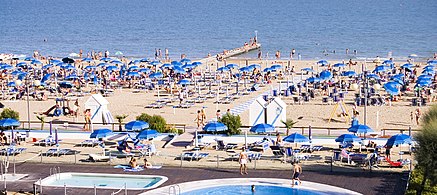Jesolo
Jesolo Gèxoło (Venetian) | |
|---|---|
| Città di Jesolo | |
 The beach of Jesolo | |
| Coordinates: 45°32′02″N 12°38′27″E / 45.53389°N 12.64083°E | |
| Country | Italy |
| Region | Veneto |
| Metropolitan city | Venice (VE) |
| Frazioni | Jesolo Lido, Jesolo Pineta, Passarella di Sotto, Cortellazzo, Ca' Pirami, Ca' Fornera, Passarella di Sotto, Piave Nuovo, Ca' Nani |
| Government | |
| • Mayor | Christofer De Zotti |
| Area | |
• Total | 95 km2 (37 sq mi) |
| Elevation | 0 m (0 ft) |
| Population (28 February 2024[2]) | |
• Total | 26,873 |
| • Density | 280/km2 (730/sq mi) |
| Demonym | Jesolani |
| Time zone | UTC+1 (CET) |
| • Summer (DST) | UTC+2 (CEST) |
| Postal code | 30016 |
| Dialing code | 0421 |
| Patron saint | St. John the Baptist |
| Saint day | 24 June |
| Website | Official website |

Jesolo (Italian pronunciation: [ˈjɛːzolo]; Venetian: Gèxoło) is a seaside resort town and comune of 26,873 inhabitants in the Metropolitan City of Venice, Italy. With around 5.5 million visitors per year, Jesolo ranks second among beach resorts in the country for number of tourists, and third in terms of nights spent there. It ranks 6th overall as a tourist destination, immediately behind the major cities of Rome, Milan, Venice and Florence. With 204,711.4 visits per thousand inhabitants, it is also one of the 50 Italian towns with the greatest tourist pressure. Its 15 kilometres of beaches and proximity to Central Europe make it a favourite destination of many German, Austrian, Dutch and French visitors.
Geography
The town lies north of Venice, between Eraclea and Cavallino-Treporti. Jesolo gives its name to a lagoon of 22 square kilometres (8.5 sq mi) on the Adriatic Sea between the rivers Sile and Piave. The urbanized area lies on an island of sorts, delimited by the rivers Piave (on the east) and Sile (on the west), and an artificial canal called Cavetta, which starts from the center of Jesolo and goes towards Cortellazzo.
The Jesolo area stretches along the Venetian coast on a flat landscape overlooking the Adriatic Sea and edged by Jesolo’s own lagoon (22 km), and by the rivers Sile and Piave. This latter is edged by the opposite Laguna del Mort. The valley of Dragojesolo together with that of Grassabò, is the largest in the northern lagoon of Venice. The coastal strip is low and sandy, consisting of an uninterrupted beach about 12 kilometres long and varying in thickness between 30 and 100 metres.
History
In Roman times the lagoon extended over the area now occupied by the town. There were several islands in the lagoon, the biggest of which was known as Equilium, the place of horses. It is thought that Jesolo represents a corruption of this name. On August 1, 2023 a tornado touched down in the town.
Origin of the name
The ancient name of Jesolo was Equilium (from the Latin equos or from Venetic ekvo) which means "town of horses". The name refers to the breeding of horses, for which the ancient Venetians were famous. The current name of Jesolo probably comes from a series of transcription errors of the oldest name (Equilo, Esulo, Lesulo, Jexulo, Jexollo, Jesolum, Giesolo). From the 16th century until 1930, Jesolo was called Cavazuccherina. This name came from the canal of the same name (in Venetian Cava), opened on 20 April and built by Alvise Zucharin (Zuccherina).
The official spelling used by the municipality is Jesolo but in the same time, the spelling Iesolo is also erroneously used. The use of "J" here is a rare example of a retained archaism, as the letter does not exist in the modern standard Italian alphabet, except in loanwords and proper names.
Economy
The city's economy is mostly based on tourism. Jesolo is a seaside resort with abundant holiday facilities and its 15-kilometre (9 mi) beach called the Lido di Jesolo. At the height of its popularity Jesolo was hosting 6.5 million tourists per year. Competition from new resort towns has reduced the numbers in more recent years. In 2020, because of the COVID-19 pandemic, Jesolo has registered around 3.5 million nights, ranking second among Italian beaches overall.
People
- Petrus de Natalibus (d. circa 1400), bishop of Equilio from 1370 to his death, and author who compiled the widely circulated book Legends of the Saints.
- Matteo Momentè (b. 1987), Italian footballer[3] who had played for Inter Milan in the early 2000s but now plays for Pistoiese.
- Dragan Cigan (1975-2007), Bosnian construction worker and a nonswimmer who jumped into a whirlpool to save two children from drowning before drowning himself. He was awarded the Gold Medal for Civil Valor and a street in Jesolo was named after him.[4]
Sport
The local football team, A.C. Jesolo, is based at the Stadio Armando Picchi and plays in the Prima Categoria Veneto group G.
Jesolo hosts the City of Jesolo Trophy, an international gymnastics competition.
Twin towns
 Velden am Wörther See, Austria, since 2006
Velden am Wörther See, Austria, since 2006
Gallery
Notes and references
- ^ "Superficie di Comuni Province e Regioni italiane al 9 ottobre 2011". Italian National Institute of Statistics. Retrieved 16 March 2019.
- ^ Data from Istat
- ^ "Matteo Momente - Player Profile - Football".
- ^ "Dragan Cigan - čovek kome se klanja Italija i čije ime morate da znate" [Dragan Cigan - The Man Before Whom Italy Bows]. Noizz (in Serbian). 18 September 2020. Retrieved 3 July 2023.
External links
![]() Media related to Jesolo at Wikimedia Commons
Media related to Jesolo at Wikimedia Commons
- Webcam Archived 2016-04-28 at the Wayback Machine from Jesolo Tourism Association.









